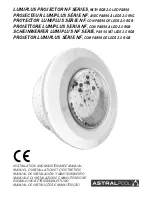
(257GS) MODEL 602G FILTER PUMP ENGLISH 7.5” X 10.3” PANTONE 295U 06/25/2014
257
GS
SAVE THESE INSTRUCTIONS
English
Page 10
COMMON POOL PROBLEMS
PROBLEM DESCRIPTION CAUSE SOLUTION
ALGAE
COLORED
WATER
SUSPENDED
MATTER IN
WATER
CHRONIC LOW
WATER LEVEL
SEDIMENT ON
POOL BOTTOM
SURFACE
DEBRIS
• Chlorine and pH levels
need adjustment.
• Copper, iron or manganese
in water being oxidized by
the added chlorine.
This is Common.
• "Hard water" caused
by a too high pH level.
• Chlorine content is low.
• Foreign matter in water.
• Rip or hole in pool
liner or hoses.
• The drain valves are loose.
• Heavy use, getting in
and out of pool.
• Pool too close to trees.
• Super chlorinate with shock
treatment. Correct pH to your
pool store's recommended level.
• Vacuum pool bottom.
• Maintain proper chlorine level.
• Adjust pH level to the
recommended level.
• Run filter until water is clear.
• Clean cartridge frequently.
• Correct the pH level. Check
with your pool dealer for advice.
• Adjust the chlorine level.
• Clean or replace your filter.
• Repair with a patch kit.
• Finger tighten all caps.
• Use Intex pool vacuum to
clean bottom of pool.
• Use Intex pool skimmer.
• Greenish water.
• Green or black
spots on pool liner.
• Pool liner is slippery
and/or has a bad odor.
• Water turns blue,
brown, or black
when first treated
with chlorine.
• Water is cloudy or
milky.
• Level is lower than
on previous day.
• Dirt or sand on
pool floor.
• Leaves, insects etc.
GENERAL AQUATIC SAFETY
Water recreation is both fun and therapeutic. However, it involves inherent risks of
injury and death. To reduce your risk of injury, read and follow all product, package and
package insert warnings and instructions. Remember, however, that product warnings,
instructions and safety guidelines cover some common risks of water recreation, but do
not cover all risks and or dangers.
For additional safeguards, also familiarize yourself with the following general guidelines
as well as guidelines provided by nationally recognized Safety Organizations:
• Demand constant supervision. A competent adult should be appointed as a “lifeguard” or
water watcher, especially when children are in and aroundthe pool.
• Learn to swim.
• Take the time to learn CPR and first aid.
• Instruct anyone who is supervising pool users about potential pool hazards and about the
use of protective devices such as locked doors, barriers, etc.
• Instruct all pool users, including children what to do in case of an emergency.
• Always use common sense and good judgement when enjoying any water activity.
• Supervise, supervise, supervise.





























